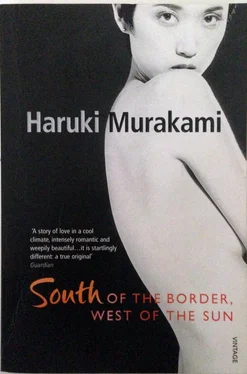Once a week I met Shimamoto. And daily I shuttled my daughters back and forth to school. And a couple of times a week I made love to my wife. Since starting to see Shimamoto again, I made love to Yukiko more often. Not out of guilt, though. Loving her, and being loved, was the only way I could hold myself together.
“You’ve changed. What’s going on?” Yukiko asked me one afternoon after sex. “Nobody told me that when men reach thirty-seven their sex drive goes into high gear.”
“Nothing’s going on. Same old same old,” I replied.
She looked at me for a while. And shook her head slightly. “My oh my, I wonder what’s going on inside that head of yours,” she said.
In my free time I listened to classical music and gazed out at Aoyama Cemetery. I didn’t read as much as I used to. My concentration was shot to hell.
Several times I saw the young woman in the Mercedes 260E. Waiting for our daughters to come out the school gate, we stood there, making small talk, the kind of gossip only someone living in Aoyama would comprehend. Advice about which supermarket lot you could find parking space in, and when; the latest on a certain Italian restaurant, which had changed chefs and now couldn’t serve decent food; news that the Meiji-ya import store was having a sale on imported wine next month, etc. Damn, I thought I’ve become a regular gossipy hausfrau! But these things were all we had in common.
In the middle of April, Shimamoto disappeared again. The last time I saw her, we were sitting in the Robin’s Nest. Just before ten, a phone call came from my other bar, something I had to take care of right away. “I’ll be back in thirty minutes or so,” I told her.
“All right,” she said, smiling. “I’ll read a book while you’re gone.”
I rushed to take care of the chore, then hurried back to the bar, but she was no longer there. It was a little past eleven. On the counter, on the back of a match book, she’d left a message: “Probably I won’t be able to come here for a while,” the note said. “I have to go home now. Goodbye. Take care.”
I was at loose ends for days. I paced around my house, wandered the streets aimlessly, and went to pick up my daughters early. And I talked with the Mercedes 260E lady. We went to a nearby coffee shop to have a cup of coffee, gossiping as usual about the state of the vegetables at the Kinokuniya Market, the fertilized eggs at the Natural House food store, the bargain sales at Miki House. The woman was a fan of Inaba Yoshie’s designer wear, and before the season arrived she ordered all the clothes she wanted from the catalog. We talked, too, about the wonderful eel restaurant near the police box on Omote Sando, which was no longer in business. We enjoyed talking. The woman was more friendly and open than she had first appeared to be. Not that I was sexually attracted to her. I just needed someone—anyone—to talk to. What I wanted was harmless, meaningless talk, talk that would lead anywhere but back to Shimamoto.
When I ran out of things to do, I’d go shopping. Once, on a whim, I bought six shirts. I bought toys and dolls for my daughters, accessories for Yukiko. I stopped by the BMW showroom a couple of times to check out the M5; I didn’t really plan to buy one but let the salesman give me his pitch.
A few unsettled weeks like this, and I found myself again able to concentrate. I’m going nowhere fast here, I decided. So I called a designer and an interior decorator to discuss remodeling the bars. They were overdue for a little remodeling anyway, and it was high time I did some serious thinking about how I ran my business. Just like with people, with bars there’s a time to leave them alone and a time for change. Being stuck in the same environment, you grow dull and lethargic. Your energy level takes a nosedive. Even castles in the air can do with a fresh coat of paint. I started with the other bar, saving the Robin’s Nest for later. I began by removing all the hyper-chic aspects of the bar, which, when you came right down to it, were a pain in the butt, the whole point being to come up with an efficient functional workplace. The audio system and air conditioning were about due for an overhaul too, as was the menu, which I drastically revamped. I interviewed my employees and came up with a hefty list of suggested improvements. In great detail I laid out to the designer my vision of what the bar should be, had him draw up a plan, then sent him back to the drawing board to incorporate features that had popped into my head in the meantime. We repeated this process a number of times. I selected all the materials, had the contractors draw up estimates, readjusted my budget. I spent three weeks scouring shops throughout Tokyo in search of the world’s greatest soap dispenser. All of this kept me extremely busy. But that, after all, was precisely what I was after.
May came and went, then it was June. Still no Shimamoto. I was sure she was gone forever. Probably I won’t be able to come here for a while , she’d written. It was this probably and for a while and the ambiguity inherent in them that made me suffer. Someday she might show up again. But I couldn’t just sit around, resting my hopes and dreams on vague promises. Keep on like this, I thought, and I’ll end up a blithering idiot so I concentrated on keeping myself busy. I started going to the pool every morning, and I’d swim two thousand meters without stopping, then go upstairs to the gym for weight lifting. A week of that, and my muscles started to rebel. Waiting at a stoplight one day, I felt my left foot go numb, and I couldn’t step on the clutch. Finally, though, my muscles got used to the workout. Hard physical effort left no room to think, and keeping my body always in motion helped me concentrate on the trivia of daily life. Daydreaming was forbidden. I tried my best to concentrate on whatever I was doing. Washing my face, I focused on that; listening to music, I was all music. It was the only way I could survive.
In the summer, Yukiko and I often took the kids to our cottage in Hakone. Away from Tokyo, in the great outdoors, Yukiko and the children were relaxed and happy. They picked flowers, watched birds with binoculars, played tag, splashed about in the river. Or else they just lay around in the yard. But they didn’t know the truth. That on a certain snowy winter day, if my plane had been grounded, I would have thrown them all away to be with Shimamoto. My job, my family, my money—everything, without flinching. And here I was, my head still full of Shimamoto. The sensation of holding her, of kissing her cheek, wouldn’t leave me. I couldn’t drive the image of Shimamoto from my mind and replace it with my wife. Just as I could never tell what Shimamoto was thinking, no one had a clue to what was in my mind.
I decided to spend the rest of our summer vacation finishing up the remodeling. While Yukiko and the children were in Hakone, I stayed in Tokyo alone to supervise the work and give last-minute instructions. I’d swim in the pool, work out at the gym. On weekends I’d go to Hakone, swim in the Fujiya Hotel pool with my kids, and we’d all have dinner together. And at night I’d make love to my wife.
I was fast approaching middle age, yet had no extra fat to speak of, no thinning hair. Not a single white hair, either. Exercise helped keep the inevitable physical decline at bay. Lead a well-regulated life, never overdo anything, and watch your diet: that was my motto. I never got sick, and most people would have guessed I was barely thirty.
My wife loved to touch my body. She’d touch the muscles on my chest and stomach, and fondle my penis and balls. Yukiko, too, was going to the gym to work out regularly. But it didn’t seem to slim her down.
“Must be getting old,” she sighed. “My weight goes down, but this roll of pudge is still here.”
Читать дальше












